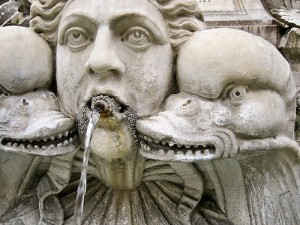The Smiling Spaniard (Catullus 39)
The cleverest thing about Catullus 39, argues Zacharia Benalayat, is the way the poem is structured to build up to the insult. Catullus’ roasting of the toothy Spaniard Egnatius for his excessive smiling and dubious dental hygiene comes off as backhanded politeness, an expression of concern, and friendly advice.
Egnatius, quod candidōs habet dentēs,
renīdet usquequāque. Sī ad reī ventum est
subsellium, cum ōrātor excitat flētum,
renīdet ille; sī ad piī rogum filī
lūgētur, orba cum flet ūnicum māter, 5
renīdet ille. quidquid est, ubicumque est,
quodcumque agit, renīdet: hunc habet morbum,
neque ēlegantem, ut arbitror, neque urbānum.
Quārē monendum est tē mihi, bone Egnati.
Si urbānus essēs aut Sabīnus aut Tiburs 10
aut parcus Umber aut obēsus Etruscus
aut Lanuvinus ater atque dentatus
aut Transpādanus, ut meōs quoque attingam,
aut quīlubet, quī puriter lavit dentēs,
tamen renīdere usquequāque tē nollem: 15
nam risū ineptō res ineptior nulla est.
Nunc Celtiber es: Celtiberiā in terrā,
quod quisque minxit, hōc sibi solet mānē
dentem atque russam dēfricāre gingīvam,
ut, quō iste vester expolītior dēns est, 20
hōc tē amplius bibisse praedicet lōti.
Image: A fountain in front of the Pantheon in Rome. Source: http://goo.gl/n4GiCd
